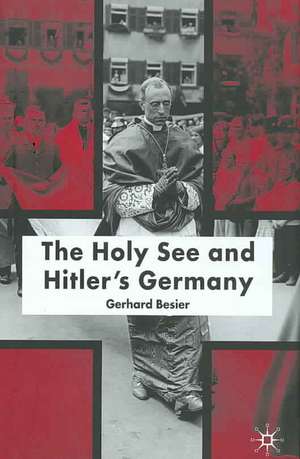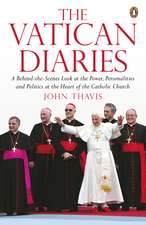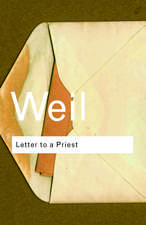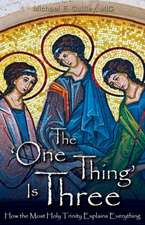The Holy See and Hitler's Germany
Autor G. Besier, Kenneth A. Loparoen Limba Engleză Hardback – 3 oct 2007
Preț: 398.32 lei
Nou
Puncte Express: 597
Preț estimativ în valută:
76.23€ • 79.13$ • 63.56£
76.23€ • 79.13$ • 63.56£
Carte tipărită la comandă
Livrare economică 22 martie-05 aprilie
Preluare comenzi: 021 569.72.76
Specificații
ISBN-13: 9781403988317
ISBN-10: 1403988315
Pagini: 300
Ilustrații: XI, 300 p.
Dimensiuni: 140 x 216 x 23 mm
Greutate: 0.5 kg
Ediția:2007
Editura: Palgrave Macmillan UK
Colecția Palgrave Macmillan
Locul publicării:London, United Kingdom
ISBN-10: 1403988315
Pagini: 300
Ilustrații: XI, 300 p.
Dimensiuni: 140 x 216 x 23 mm
Greutate: 0.5 kg
Ediția:2007
Editura: Palgrave Macmillan UK
Colecția Palgrave Macmillan
Locul publicării:London, United Kingdom
Cuprins
Preface PART I: GERMANY AND THE EUROPEAN POLICIES OF THE VATICAN, 1904-1920 Eugenio Pacelli: State Canonist, Diplomat and Authority on Canon Law Pacelli Becomes Apostolic Nuncio in Munich (1917) and Advocates the Pope's Peace Initiative The Position of the Munich Nuncio on Revolution and the Efforts of the Holy See for a Just Peace Setting Up an Embassy of the German Reich at the Holy See and the Berlin Nunciature (1920) The Hitler Putsch and Pacelli's Move to Berlin PART II: VATICAN FOREIGN POLICY BETWEEN 1920-1929 Catholic Nationalism in Poland and the Role of Achille Ratti The Vatican's Negotiations with Soviet Russia The Holy See between Germany and Poland Pacelli, the Centre, and the Concordat Policy towards Prussia and the Reich The Vatican's Clerical 'Domestic Policy' in Germany The Lateran Treaty and the Restoration of the Papal States Pacelli's Verdict of the Catholic Church in Germany at the End of His Nunciature PART III: THE FOREIGN POLICY OF THE VATICAN UNDER CARDINAL SECRETARY OF STATE PACELLI (1930-1939) First Conflicts with Italian Fascism, Developments in the Catholic Parties of Germany and Austria First Conflicts with National Socialism 'God Wills It!' The ideal of the Catholic Corporate State and the Attempt to Establish It in a Number of Catholic States in Europe The Visits of Göring and Brüning to the Vatican Pius XI's Understanding of the Kingdom of Christ 'C'est Mon Concordat!' - The Origin of the 1933 Reich Concordat Persecution of Jews and Catholics The End of His Munich Nunciature Struggle over the Implementing Regulations in Article 31 of the Reich Concordat Catholicization of National Socialism? The Bridge-Building Attempt of Alois Hudal The Holy Office's Drafts against Totalitarian Systems (1935-36) The Spanish Civil War The Three Papal Encyclicals of March 1937 The 'Anschluss' of Austria The Encyclical Draft on Racism Hitler in Rome, the Instruction against Racism, and the Reichspogromnacht in 1938 The Death of Pius XI, the Election ofPacelli as Pope, and the Threat of War The 'Fullness of the Divine Right to be Obeyed', the Authoritarian Catholic Ideal of the State and the Totalitarian States List of abbreviations Notes List of sources and references Index of persons
Recenzii
'The wartime years of the pontificate of Pius XII (1939-1958) have triggered what are known as 'the Pius Wars', involving whether or not the Pope was unduly silent during the Holocaust. Much of this intense debate concerns whether Eugenio Pacelli, who became Pius XII, was antisemitic or pro-German leading some to dub him 'Hitler's Pope'. In this remarkable and well-written book, the leading German ecclesiastical historian Gerhard Besier uses new sources to explore Pacelli's career before he became Pope, including his years as Nuncio to both Bavaria and then Germany, and then his years as Vatican Secretary of State. The approach is engaging, Besier's conclusions arresting, and the book is essential reading to any one interested in German or Vatican diplomacy during the 1920s and 1930s.' - Michael Burleigh, author of Earthly Powers: Politics and Religion in Europe from the French Revolution to the Great War
'A terrifying and deeply troubling book. Well-written and well-documented..it should be widely-read.' - Tribune
'A terrifying and deeply troubling book. Well-written and well-documented..it should be widely-read.' - Tribune
Notă biografică
FRANCESCA PIOMBO has been a Researcher at the Hannah Arendt Institute for Research in Totalitarianism at the Technical University, Dresden, Germany since 2003.








